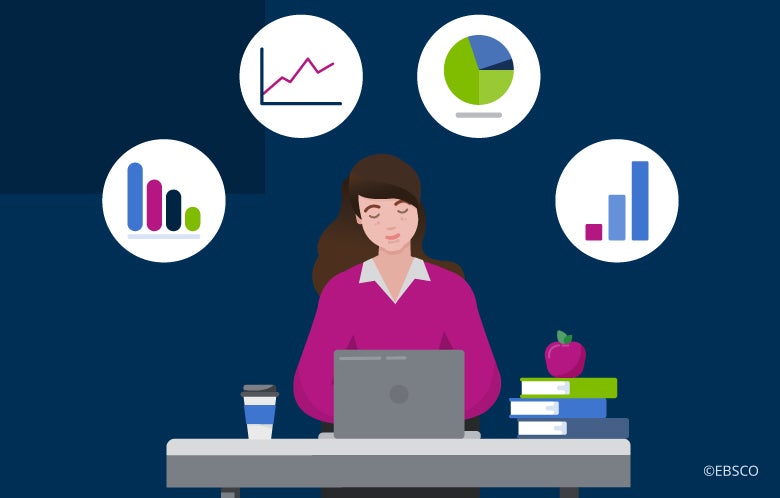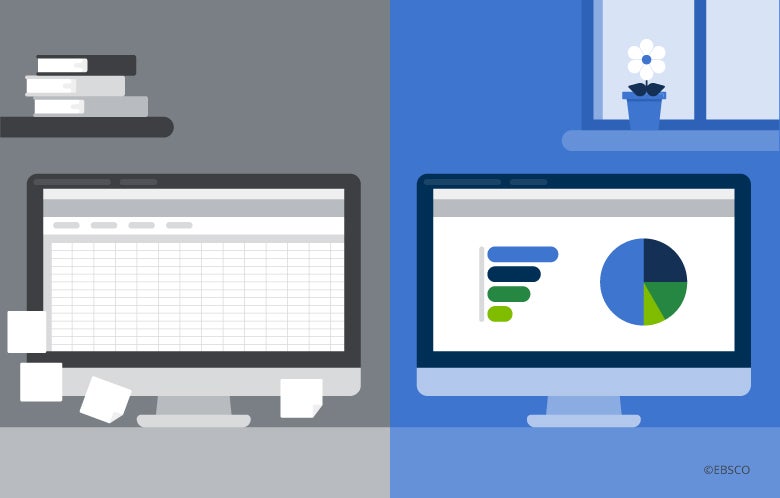In October 2020, EBSCO announced the development of a library analytics platform in partnership with three institutions — University of Denver, Rensselaer Polytechnic Institute and Chalmers University of Technology. The project is now in a beta phase with additional library partners including the University of South Carolina, the University of Melbourne and Seton Hall University among others.
We spoke with EBSCO’s Director of Product Management John McDonald about the project to find out why EBSCO is investing in a next-generation analytics platform.
Why did EBSCO decide to create an analytics platform?
We are always looking for ways to improve and enhance the workflow of librarians. In this case, we wanted to partner with libraries to advance the science of library analytics, helping them to analyze data rather than depend on the manual processes of managing data. By doing this, librarians can spend their time making informed decisions instead of being buried in the process of pulling numbers. the burden on technical staff will be reduced and barriers to data analytics will be eliminated by removing unintentional gatekeepers.
Why should library decision makers consider investing in an analytics platform?
Now more than ever, it is important for libraries to demonstrate their value and make wise purchasing decisions, given the coronavirus pandemic and pending budget cuts. Data-informed decisions are ultimately the wisest decisions and can be justified with faculty, leadership and even library users. Having that evidence helps balance collection reduction decisions with other decisions that need to be made in the library.
Having this type of insight into library data helps libraries to spot trends within their institutions. This platform can also connect student success to usage, which is important when considering interdepartmental conversations with faculty and institution stakeholders.
Why should libraries consider investing in an analytics platform?
Currently, librarians measure analytics (collection development decisions, usage metrics, etc.) through more traditional means, e.g. pulling manually from multiple data sources. More of their time is spent gathering data rather than analyzing it.
By leveraging a platform using automated processes that harvest and manage data on a continuous basis, the burden is reduced on librarians, enabling them to recover extremely valuable time in their busy work schedules. They can spend that time analyzing data and getting a better insight into library processes, using their highly specialized expertise to make informed decisions about their budget, processes and collections.
Data-informed decisions are ultimately the wisest decisions and can be justified with faculty, leadership and even library users. Having that evidence helps balance collection reduction decisions with other decisions that need to be made in the library.
Data-informed decisions are ultimately the wisest decisions and can be justified with faculty, leadership and even library users. Having that evidence helps balance collection reduction decisions with other decisions that need to be made in the library.
What are the main differentiators of this new platform?
Librarians need a clear picture of the library’s landscape across collections, services and operations. The EBSCO platform will do just that, providing more advanced metrics with greater context. Libraries will work from one dashboard that provides data on spend and cost, as well as circulation, in real time. That single dashboard will provide automated processes to generate reporting requirements, will have the potential to harvest all the data needed to report ARL or ACRL or other required regional & national statistics automatically. Other data that is incorporated into this new platform isn’t as commonly analyzed as library usage data and includes gate counts, Wi-Fi usage, building service point usage, and usage of co-located services (writing center, tutoring, computer lab, etc.).
EBSCO is working with several beta partners to develop the platform. What have some of your partners noted during this process?
Rensselaer Polytechnic University Director of Library Services Andrew White noted that the platform would have come in handy during the recent pandemic lockdown. He said his library was tasked with identifying performance metrics, measuring comparisons between e-resource usage and examining inter-library loan activity — all important metrics to have on hand while users worked remotely and their landscape moved entirely to digital.
We also work closely with the library staff at University of Denver. Dean of Libraries Michael Levine-Clark has been looking for a tool that would help staff not only make more informed collection development decisions but also in the areas of instructional support, building services, and student outcomes. He is looking forward to a dashboard that continuously monitors the library’s contribution to the educational mission of the university.
Together with our partners, we are on track to deliver a comprehensive, easy-to-use analytics platform in the first half of 2021. We’ll provide updates on EBSCOpost on our progress and findings to date.



